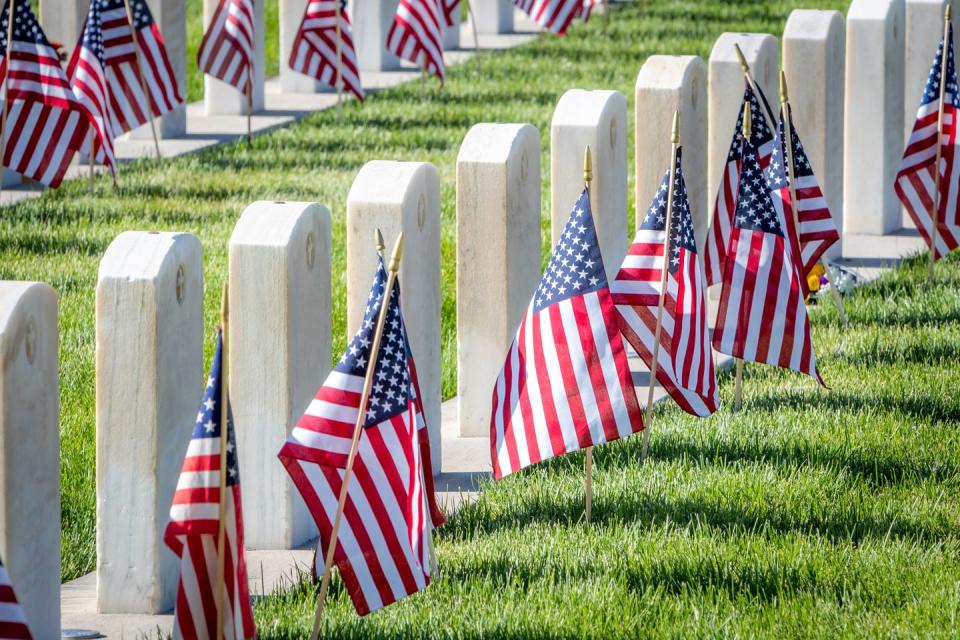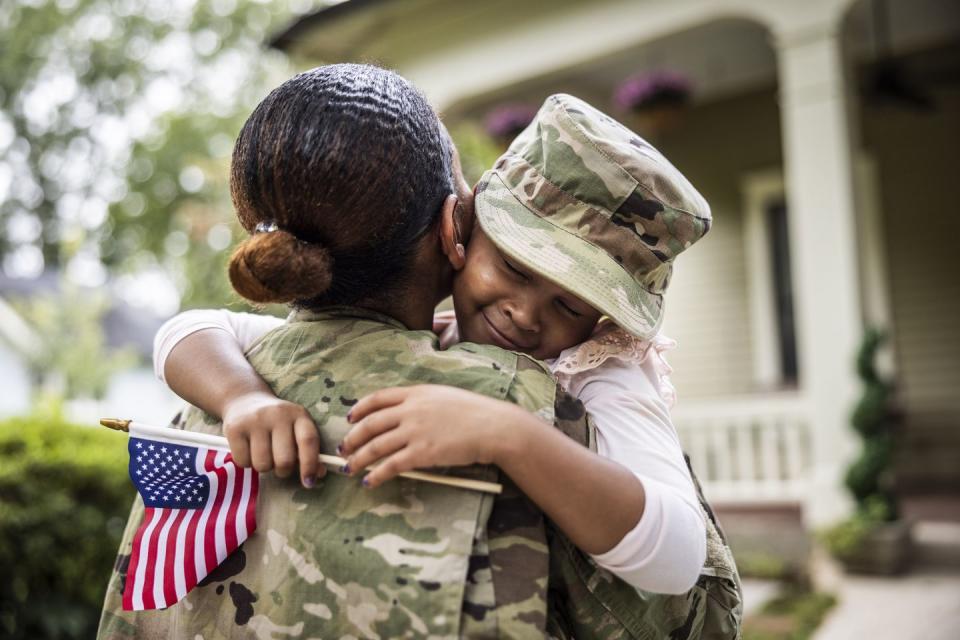What's the Difference Between Memorial Day and Veterans Day?

"Hearst Magazines and Yahoo may earn commission or revenue on some items through these links."
As we come ever closer to the unofficial start of summer, with its barbecues, bike rides, and beach getaways, you might find yourself asking what's the difference between Memorial Day and Veterans Day? Other than the obvious, of course: Memorial Day takes place the last Monday in May, capping off a three-day weekend that most folks see as the sunny season's beginning, while Veterans Day falls on November 11 every year. But because both holidays honor the heroes who have valiantly served in America's armed forces, trying to distinguish between the two can get a little confusing.
Even so, Memorial Day and Veterans Day each have their own unique histories and traditions—and, of course, the latter has its slightly strange spelling. While you might think there would be an apostrophe at the end of the "s" to make "Veterans" possessive, according to the U.S. Department of Veterans Affairs, "Veterans Day does not include an apostrophe but does include an “s” at the end of “Veterans” because it is not a day that “belongs” to veterans; it is a day for honoring all veterans."
Now that we have that straight, let's take a deeper dive into the ins and outs (as well as the dos and don'ts) of these two most wonderfully patriotic American holidays. Ahead, you'll find the full 411 on Memorial Day and Veterans Day, including who they recognize, why and when they were founded, and how they're observed, as well as a few helpful suggestions about the best ways to spend each day.
What is the major difference between Memorial Day and Veterans Day?
While both Memorial Day and Veterans Day are federal holidays and a great time to share patriotic quotes and play patriotic songs, there is a very big difference between the two. It's absolutely crucial to recognize that distinction so you can pay proper tribute to our servicemen and women on each holiday. According to the VA, Memorial Day was specifically "set aside as a day for remembering and honoring military personnel who died in the service of their country, particularly those who died in battle or as a result of wounds sustained in battle."
While Veterans Day may also recognize those who made the ultimate sacrifice, the VA further notes that "Veterans Day is largely intended to thank living veterans for their service, to acknowledge that their contributions to our national security are appreciated, and to underscore the fact that all those who served—not only those who died—have sacrificed and done their duty." Specifically, Veterans Day acknowledges those who have served in times of peace as well as during war.
Despite the popularity of sales and cookouts on Memorial Day weekend, the holiday remains at its heart a solemn occasion and a time of reflection for many. For this reason, you may want to skip wishing people "Happy Memorial Day," and instead opt for something like "May you have a meaningful Memorial Day." Likewise, because it honors fallen soldiers, this isn't the right moment to thank current troops for their service. Veterans Day is an appropriate time to express your appreciation to them, although you probably should avoid telling anyone "Happy Veterans Day," because it is also more of a thoughtful holiday than a purely celebratory one.

Is Memorial Day just for fallen soldiers?
From its very start, Memorial Day was intended to recognize only those lost in battle. While it's still a little unclear exactly when the first Memorial Day really occurred, we do know an event honoring local men killed in the Civil War took place in tiny Boalsburg, Pennsylvania, in 1864. Two years later, Waterloo, New York, is said to have organized a day to remember fallen soldiers on May 5, 1866. A century later, in 1966, the town was officially recognized as the originator of Memorial Day by federal legislation, although some 25 other communities still claim to have originated the holiday.
In 1868, the Grand Army of the Republic, an organization of Union veterans, led the charge to establish May 30 as Decoration Day, formalizing the increasingly popular custom of placing flowers on the graves of those lost in the Civil War. New York became the first state to make the observance a legal holiday in 1873; by the end of World War I, Decoration Day's focus had grown to include any American killed while fighting for their country, not just those who perished in the bloody conflict.
Although the holiday's name eventually evolved into Memorial Day, the essence has remained the same: recognizing the sacrifices of those who paid the ultimate price in service to our great nation. In 1968, 100 years after Decoration Day was first observed nationwide, President Johnson signed the Uniform Monday Holiday Bill into law. It made Memorial Day a federal holiday commemorated on the last Monday in May, a change that took effect in 1971. (This year, Memorial Day falls on May 27.)
Is it okay to honor veterans on Memorial Day?
Because Memorial Day is specifically meant to recognize our lost military personnel, it's a bit of an etiquette blunder to acknowledge all veterans on the holiday. Instead, Americans are encouraged to thank our veterans every other day of the year, including and especially on Veterans Day. Although, strangely enough, the holiday didn't start off as a way to remember those who have served in the military.
First dubbed Armistice Day, it was established to celebrate the end of WWI—specifically, the cessation of fighting between Allied forces and Germany at 11 a.m. on November 11, 1918. President Wilson proclaimed the first Armistice Day a year later and Congress recognized it in 1926, but it wasn't until 1938 that November 11 became a legal holiday dedicated to world peace.
Sadly, the dream of a harmonious, conflict-free planet didn't last long, and, following World War II, the American people rallied behind the idea of a day honoring veterans instead. In 1947, Birmingham, Alabama, held the first National Veterans Day event, with the holiday legally morphing into Veterans Day in 1954. The Uniform Monday Holiday Bill of 1968 moved Veterans Day from November 11 to the fourth Monday in October, which caused a bit of an uproar with the public. By 1975, President Ford had restored the holiday to its original annual date of November 11, which became effective in 1978.

Are Veterans Day and Remembrance Day the same?
Americans were not the only people who instituted an Armistice Day in the period following WWI. Our allies in Great Britain and France also established the holiday, although in British Commonwealth countries, it's now known as Remembrance Day. Here in the United States, we also have another holiday set aside to honor military personnel: Armed Forces Day. Created in 1949, it is observed the third Saturday in May, which falls on the 18th this year. According to the USO, "Armed Forces Day is the proper day to honor all of the men and women currently serving, as well as those who have served and sacrificed to defend our freedom."
Wondering how best to observe Memorial Day and Veterans Day? Sticking with tradition isn't a bad idea. For Memorial Day, consider volunteering to decorate our fallen soldiers' graves with American flags, or perhaps think about visiting a cemetery or a memorial. Some people decorate their homes for these holidays in red, white, and blue or wear poppies as a tribute to lives lost in battle. Many communities host parades with appearances from military personnel on both of these special days.
In addition, on Memorial Day as well as Veterans Day, annual remembrance ceremonies take place at Arlington National Cemetery, which are open to the public and usually also live streamed. No matter how you choose to spend Memorial Day, do make sure to pause at 3 p.m. local time for the National Moment of Remembrance. Established in 2000 by an act signed by President Clinton, it encourages all Americans to take at least one minute to reflect on those who gave their lives defending our country in conflicts here and abroad.
You Might Also Like

